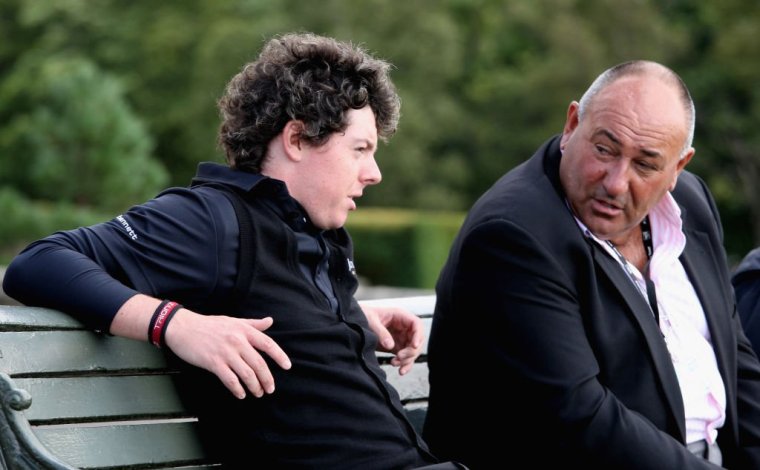This was supposed to be the week that Rory McIlroy did a lap of honour around Hilton Head, the PGA Tour’s poster boy parading about the RBC Heritage at Harbour View, one of this season’s new, elevated events, in a green jacket. Instead McIlroy is not here, withdrawing after missing the cut at the Masters to leave Jon Rahm to fill the power space.
We are left to infer that McIlroy simply could not rouse himself days after his latest humbling at the first major of the season. The importance that McIlroy places upon the Masters is one of the reasons he finds it so hard to win, according to his former manager Chubby Chandler. And unless he can find a way to decouple himself from the sense of history associated with victory at the Masters, Chandler advances the unpalatable view that McIlroy might never succeed at Augusta National.
“If you were a betting man you would probably bet against him winning. He has made winning the grand slam [all four majors] a bigger thing in his head than it actually is,” Chandler tells i. “He is not really driven by number of wins or number of majors per se, but he seems to be driven by wanting to win the grand slam. It’s a massive mental block and it’s getting harder and harder. Every time he gets there he has the pressure from everyone else, but also from himself.”

Chandler recalled the uncomplicated kid that he introduced to professional golf at 17. The free-spirited McIlroy earned his European Tour card at only his third professional event, the Madrid Open at the back end of 2007, and a little more than a year later won for the first time aged 19 at the Dubai Desert Classic and finished tied 20th on his Masters debut. “When he played like he used to play with a high, looping draw, Augusta was perfect for him,” Chandler adds. “He hit it miles, the ball went around the doglegs like it needed to.”
McIlroy was, of course, nine holes from winning his first major at Augusta in 2011, before the sky fell in on the back nine. His collapse to 15th place, precipitated by hitting a tree off the 10th tee and taking a seven, was not necessarily a defining moment, according to Chandler, who points to his recovery at Congressional, where he won the US Open by a record margin just two months later. McIlroy’s problem at Augusta has developed over time as a consequence among other things of his growing influence and power in the game. He is in this regard, argues Chandler, a victim of his own success.
“To me he has got carried away as mouthpiece of the PGA Tour. He is doing things he shouldn’t be doing and opening his mouth too often. The interview on the fairway [at the Masters], absolutely brilliant TV but not good for Rory McIlroy. You can’t be having a chat with a guy in the commentary box about the day and the way he is playing, or whatever, then get over a wedge and give it 100 per cent. You would never have got [Jack] Nicklaus doing it. You would never have got Tiger [Woods] doing it.
“If you could see into his head back in the days when he was flying around Augusta there was nothing in there other than hitting a golf ball. Now he has commitments with PGA Tour, where he has been groomed as a political figurehead, with TV, with half a dozen really big sponsors. And they take up time. He now has Workday [software company]. Workday put an add on TV, that will take a day of his time. That clutter manifests itself on the course. He needs to get away from a lot of that, and just trust his talent.”
As Chandler points out that McIlroy has still had a brilliantly successful career and should be commended for all that he has achieved; 31 victories, including four majors, remains a substantial contribution bettered only by the few. “You can’t dismiss what he has done. He is a fantastically talented golfer who has amassed a massive bank account, his parents are taken care of, he has a great little family and his best mate is on the bag. I can’t see much to complain about. I’m sure he is very content with his life right now.”
Well, yes and no. Yes, from the point of view of mortals. But not yet from the purists’ perspective, a wildly critical school that holds any great golfer to the standards set by Gene Sarazen, Ben Hogan, Jack Nicklaus, Tiger Woods and Gary Player, the only golfers to have won all four-majors.
When McIlroy looks back on what he may have done differently Chandler suggests he might have done better to retain a commanding, critical voice within his camp to take care of business, to question his thinking and to provide a different way of seeing. “He employs everybody around him. He has not got anyone to say that’s not right, why are you saying that, why are you doing this? None of that. Fair play, he is his own man, he makes his own mistakes and apologises for them. But some of the stuff he is doing is not helping him and it comes at a cost, and that is probably another 10 tournament wins.”



